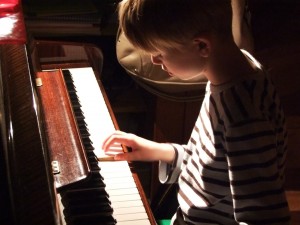Playing Music as a Protection Against Dementia
 In a recent post we saw that music may help people with dementia learn new facts. This article explores another relationship between music and dementia: playing a musical instrument, even as an amateur, may protect the brain later on against dementia-related damages.
In a recent post we saw that music may help people with dementia learn new facts. This article explores another relationship between music and dementia: playing a musical instrument, even as an amateur, may protect the brain later on against dementia-related damages.
Researchers had 70 people ages 60 to 83 perform a variety of tests to measure visuospatial memory, ability to name objects, the brain’s ability to adapt to new information […] those who had engaged in musical activity for 10 years or longer scored substantially better than those with no musical activity in their past.
the longer people play instruments, the more benefits they may derive.
All were amateurs who had started playing when they were 10 years old.
the relationship between cognitive skills and years of musical activity held up whether the musicians were currently involved in making music or not.
As the article points out this study shows an association between playing a musical instrument and cognitive skills, which doesn’t imply a causation effect. It is also not clear what in playing a musical instrument is good for the brain. However we know that professional musicians’ brains are different in some areas that non-professional musicians’ ones. This suggests that playing a musical instrument triggers neuroplastic changes in the brain. These changes seem to contribute to brain/cognitive reserve and be neuroprotective.
Related post: Neuroplasticity: the potential for lifelong brain development


